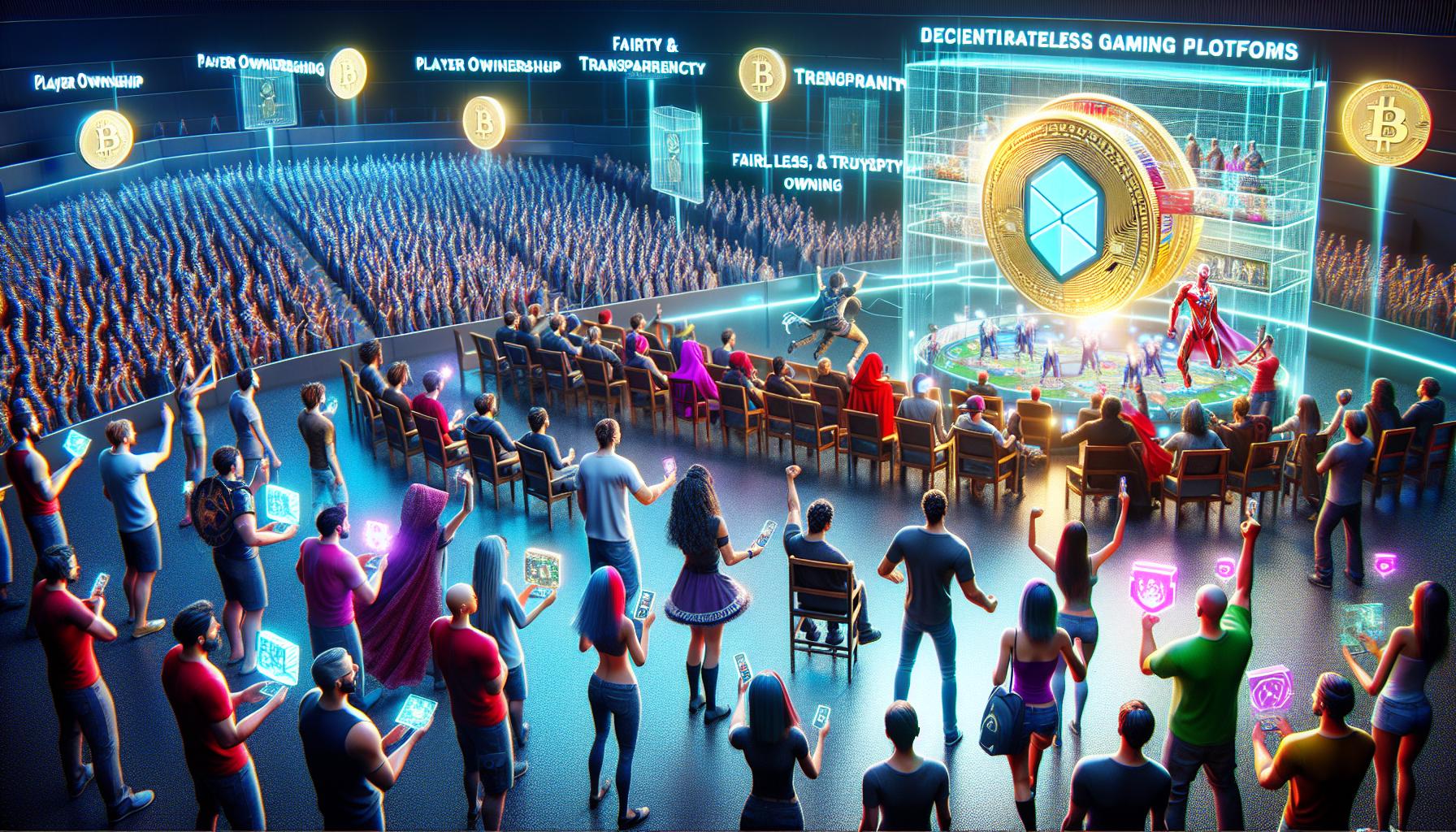Are you tired of worrying about the fairness and security of online gaming platforms? Look no further! In this article, we will introduce you to the concept of a trustless gaming platform that aims to revolutionize the way we play games online.
Imagine a gaming platform where you don’t have to rely on blind trust in a centralized authority. With a trustless gaming platform, you can enjoy your favorite games with the assurance that everything is transparent, secure, and fair.
In the following paragraphs, we will delve into the key features and benefits of a trustless gaming platform, exploring how it leverages blockchain technology to eliminate the need for intermediaries and create a decentralized ecosystem that puts the power back in your hands. Get ready to discover a new era of gaming where trust is no longer a concern.
What is a Trustless Gaming Platform?
In the world of online gaming, trust is a crucial factor. Players need to trust that the gaming platform they are using is fair, secure, and transparent. However, this blind trust in a centralized authority can often lead to concerns about data privacy, manipulation of game outcomes, and financial disputes.
This is where a trustless gaming platform comes into play. A trustless gaming platform is a revolutionary concept that leverages blockchain technology to eliminate the need for intermediaries and create a decentralized ecosystem. It redefines the way online gaming operates by ensuring fairness, transparency, and security without the need to rely on blind trust.
In a trustless gaming platform, all transactions and game outcomes are recorded on a blockchain, a secure and immutable digital ledger. This ensures that no one can alter or manipulate the results, providing a fair and transparent gaming experience. Smart contracts are used to enforce the predetermined game rules, removing the need for a centralized authority to oversee the process.
By removing the need for trust in a centralized authority, a trustless gaming platform empowers players with true ownership of their in-game assets. With the help of blockchain, players have the ability to trade, sell, or use their digital assets across multiple games and platforms securely and with complete control.
Another key feature of a trustless gaming platform is decentralization. Traditional gaming platforms are controlled by a single entity, which can lead to potential abuse of power. In a trustless gaming platform, decision-making power is distributed among the network participants, ensuring a fair and democratic gaming ecosystem.
A trustless gaming platform eliminates the need for blind trust by leveraging blockchain technology. It provides a fair, transparent, and secure gaming experience by recording all transactions and game outcomes on a blockchain, using smart contracts to enforce game rules, and empowering players with true ownership of their in-game assets. With the rise of trustless gaming platforms, a new era of online gaming is on the horizon, where trust is no longer a concern.
Why Do we Need a Trustless Gaming Platform?
In the world of online gaming, trust is everything. When you participate in an online game, you expect that the game is fair, the outcomes are not manipulated, and your personal information is secure. However, blind trust in a centralized authority can lead to concerns about data privacy, game manipulation, and financial disputes. This is where a trustless gaming platform comes into play.
A trustless gaming platform leverages blockchain technology to create a decentralized ecosystem that ensures fairness, transparency, and security without the need for blind trust. By using a blockchain to record all transactions and game outcomes, this platform guarantees that they cannot be altered or manipulated. This not only protects the integrity of the game but also gives players peace of mind knowing that they are playing on a level playing field.
One of the key components of a trustless gaming platform is the use of smart contracts. Smart contracts are self-executing contracts with the terms of the agreement written into code. They automatically enforce game rules, eliminating the need for a centralized authority to oversee the gaming process. This not only reduces the risk of fraud and manipulation but also ensures that all players are treated fairly and consistently.
In addition to ensuring fairness and transparency, a trustless gaming platform also empowers players with true ownership of their in-game assets. Traditionally, players do not have control over their virtual items or currency, and they cannot use them outside of a specific game. However, a trustless gaming platform allows players to securely trade, sell, or use their digital assets across multiple games and platforms. This opens up a whole new world of possibilities and economic opportunities for gamers.
Decentralization is another key feature of a trustless gaming platform. Instead of relying on a single central authority, power is distributed among the participants of the network. This creates a fair and democratic gaming ecosystem where decisions are made collectively and no single entity can dominate or manipulate the system for their advantage.
A trustless gaming platform addresses the key concerns in online gaming by leveraging blockchain technology, smart contracts, and decentralization. It ensures fairness, transparency, and security without the need for blind trust in a centralized authority. With true ownership of in-game assets and the ability to trade them across multiple games, trustless gaming platforms are ushering in a new era of online gaming where trust is no longer a concern.
Key Features of a Trustless Gaming Platform
A trustless gaming platform offers several key features that set it apart from traditional online gaming platforms. These features ensure fairness, transparency, security, and player empowerment. Let’s explore some of the key features in more detail:
1. Decentralization: One of the most important features of a trustless gaming platform is its decentralized nature. Unlike traditional platforms that rely on a central authority to regulate game outcomes and transactions, a trustless gaming platform operates on a blockchain, which is a decentralized and transparent ledger. This decentralization ensures that no single entity has absolute control, making the gaming ecosystem fair and democratic.
2. Blockchain Technology: Trustless gaming platforms leverage blockchain technology to record all game transactions and outcomes immutably. Every action, from in-game purchases to game results, is permanently recorded on the blockchain. This means that no one can alter or manipulate the data, ensuring fairness and transparency. Players can have peace of mind knowing that the outcomes of their games are based on a tamper-proof system.
3. Smart Contracts: Smart contracts play a vital role in enforcing game rules and eliminating the need for a centralized authority. These self-executing contracts are stored on the blockchain and automatically execute predefined actions when certain conditions are met. Trustless gaming platforms use smart contracts to ensure that all players follow the rules and that transactions occur securely. This eliminates the potential for biased decision-making and prevents disputes.
4. True Ownership of Assets: In traditional online gaming, players often invest time and money into acquiring in-game assets, such as virtual currencies, characters, or items, only to find themselves at the mercy of the platform’s policies. With a trustless gaming platform, players have true ownership of their digital assets. The use of blockchain technology enables players to securely trade, sell, or use their assets across multiple games and platforms. This gives players greater control and freedom over their gaming experience.
5. Enhanced Security: Trustless gaming platforms prioritize the security of players’ data and assets. By utilizing blockchain technology, these platforms reduce the risk of data breaches and hacking attempts. The decentralized nature of the platform ensures that data is distributed across multiple nodes, making it difficult for malicious actors to compromise the system. Additionally, the use of cryptographic techniques ensures that transactions are secure and private.
How Does a Trustless Gaming Platform Work?
A trustless gaming platform operates on the principles of decentralization, blockchain technology, and smart contracts to ensure fairness, transparency, and security in online gaming. Here’s a breakdown of how it works:
Decentralization:
- A trustless gaming platform eliminates the reliance on a centralized authority, such as a game developer or operator.
– Instead, the platform leverages a decentralized network of computers, known as nodes, to validate and record all transactions and game outcomes on a blockchain.
Blockchain Technology:
- The platform utilizes blockchain technology, which is essentially a distributed and immutable ledger.
- Every transaction and game event is recorded in blocks that are added to the blockchain in a chronological order.
- This ensures that all data on the platform is transparent, tamper-proof, and cannot be altered or manipulated.
Smart Contracts:
- Smart contracts are self-executing agreements with predefined rules encoded on the blockchain.
- In a trustless gaming platform, smart contracts are used to enforce game rules and ensure all participants adhere to them.
- For example, the outcome of a game is automatically determined by the smart contract based on predefined rules, eliminating the need for a centralized authority to resolve disputes.
True Ownership of Assets:
- One of the key features of a trustless gaming platform is that it empowers players with true ownership of their in-game assets.
- Through blockchain technology, players have complete control over their digital assets, and they can securely trade, sell, or use them across multiple games and platforms.
- This gives players the freedom and flexibility to monetize their gaming experience and enhances the overall value of their in-game assets.
- Trustless gaming platforms provide enhanced security by eliminating the risk of data breaches and hacks that are common in centralized systems.
- As each transaction and game outcome is recorded on a distributed network, it becomes extremely difficult for malicious actors to manipulate or alter the data.
- Additionally, the use of cryptographic techniques in blockchain technology ensures that player identities and transactions remain anonymous and secure.
Benefits of Using a Trustless Gaming Platform
A trustless gaming platform offers several benefits that can revolutionize the online gaming industry. By leveraging blockchain technology and decentralized principles, these platforms provide a fair and secure gaming ecosystem for players. Here are some of the key benefits of using a trustless gaming platform:
- Enhanced Security: Traditional online gaming platforms typically store player data and financial information on centralized servers, making them vulnerable to hacking and data breaches. In contrast, trustless gaming platforms use blockchain technology to store and validate all transactions and game outcomes. This decentralized approach ensures that the data cannot be altered or manipulated, providing a higher level of security for players.
- True Ownership of Assets: In traditional gaming platforms, players often have limited control over their in-game assets. However, trustless gaming platforms enable players to have true ownership of their digital assets through blockchain technology. This means that players have full control and can securely trade, sell, or use their in-game assets across multiple games and platforms. It introduces a new level of player autonomy and value to the gaming experience.
- Transparency and Fairness: One of the most significant advantages of trustless gaming platforms is the transparency and fairness they bring to the gaming ecosystem. By utilizing blockchain technology, all transactions and game outcomes are recorded and transparently available for verification. This level of transparency ensures that the gaming experience is fair for all players, as it eliminates the potential for manipulation or cheating.
- Lower Costs and Fees: Trustless gaming platforms aim to reduce or eliminate intermediaries, such as payment processors or third-party escrow services, which can be costly. With the use of smart contracts on the blockchain, these platforms streamline transactions, reducing fees and minimizing the need for additional intermediaries. This results in a more cost-effective gaming experience for players.
- Cross-Platform Interoperability: Trustless gaming platforms also enable cross-platform interoperability, allowing players to seamlessly use their digital assets across different games and platforms. This eliminates the need for players to start from scratch in each game and enhances the overall gaming experience. It also opens up new opportunities for collaboration and innovation within the gaming industry.
Trustless gaming platforms offer enhanced security, true ownership of assets, transparency, lower costs, and cross-platform interoperability. These benefits are transforming the online gaming industry by creating a fair and secure environment for players and empowering them with greater control over their gaming experience.
Challenges and Limitations of Trustless Gaming Platforms
While trustless gaming platforms offer numerous benefits to players and the overall gaming ecosystem, it is important to acknowledge the challenges and limitations they face.
1. Scalability: One of the primary challenges faced by trustless gaming platforms is scalability. Blockchain technology, while ensuring transparency and security, can be limited in terms of transaction speed and throughput. As the number of players and transactions increase, it becomes more challenging for the blockchain to handle the load efficiently. This can result in slower transaction times and increased costs for players.
2. User Experience: Another limitation of trustless gaming platforms is the user experience. Due to the decentralized nature of these platforms, players may face additional complexity when interacting with the blockchain and managing their in-game assets. This can include the need to set up cryptocurrency wallets, navigate complex interfaces, and understand the mechanics of decentralized applications. Improving the user experience and making the platform more accessible to all types of players is an ongoing challenge for trustless gaming platforms.
3. Regulatory and Legal Frameworks: Trustless gaming platforms operate in a relatively new and evolving regulatory landscape. The legality and compliance of certain aspects, such as cross-platform asset trading or the use of cryptocurrencies, may vary across jurisdictions. This lack of clarity and consistency can pose challenges for trustless gaming platforms, as they need to navigate and comply with regulations while ensuring the decentralized nature of their platforms remains intact.
4. Adoption and Awareness: Despite the potential benefits, trustless gaming platforms still face the challenge of adoption and awareness. Many players may not be familiar with blockchain technology and its implications for gaming, and may be hesitant to migrate from traditional centralized platforms. Building trust and educating players about the advantages of trustless gaming platforms is crucial to drive adoption and grow the ecosystem.
While trustless gaming platforms have their fair share of challenges and limitations, steady progress is being made to address these issues and improve the overall experience for players. As the technology continues to evolve, it is expected that trustless gaming platforms will become more scalable, user-friendly, and better aligned with existing regulatory frameworks. By tackling these challenges head-on, trustless gaming platforms can redefine the online gaming industry and offer a safer, fairer, and more empowering gaming experience for players.
The Future of Trustless Gaming Platforms
Trustless gaming platforms have already shown great promise in revolutionizing the online gaming industry. As the technology continues to advance and more players become aware of its benefits, we can expect the future of trustless gaming platforms to be even brighter. Here are a few key aspects to consider:
- Increased Adoption and Awareness: As players become more educated about the advantages of trustless gaming platforms, we can anticipate a surge in their adoption. The decentralized nature of these platforms ensures fairness, security, and true ownership of in-game assets. With greater awareness and understanding, players will be more inclined to choose trustless gaming platforms over traditional centralized ones.
- Evolving Technological Advancements: The development of trustless gaming platforms will continue to see advancements in blockchain technology and smart contracts. These advancements will further enhance the scalability, speed, and efficiency of trustless platforms, allowing for more complex games and larger player communities. Improved user experiences and seamless interactions will be the focus of ongoing technological advancements.
- Integration with Mainstream Gaming Industry: Trustless gaming platforms are gradually gaining recognition and partnerships with established gaming companies. This integration will play a vital role in bridging the gap between the traditional gaming industry and the decentralized gaming ecosystem. With more partnerships and collaborations, trustless gaming platforms will gain wider acceptance and attract a larger player base.
- Regulatory Frameworks and Legal Considerations: As the popularity of trustless gaming platforms grows, regulatory bodies will likely start paying closer attention. Governments and regulatory authorities will need to adapt and create frameworks to ensure consumer protection, prevent fraud, and establish clear rules for decentralized gaming platforms. Building a legal framework that supports the growth of trustless gaming will be critical for its future success.
- Community-Driven Development: Trustless gaming platforms rely heavily on community involvement. The future of these platforms will depend on active participation from players, developers, and enthusiasts who contribute to the growth and improvement of the ecosystem. Community feedback, suggestions, and ideas can shape the ongoing development and direction of trustless gaming platforms, making them more responsive to the needs and desires of players.
Conclusion
Trustless gaming platforms have the potential to revolutionize the online gaming industry by addressing key concerns such as trust, fairness, and security. By leveraging blockchain technology, these platforms eliminate the need for blind trust in a centralized authority, ensuring transparency and immutability of game outcomes and transactions.
With trustless gaming platforms, players have true ownership of their in-game assets and the ability to securely trade or use them across multiple games and platforms. This empowers players and creates a more dynamic and interconnected gaming ecosystem.
The future of trustless gaming platforms looks promising, with increased adoption and awareness, evolving technological advancements, integration with the mainstream gaming industry, and the development of regulatory frameworks. These factors will contribute to the wider acceptance and success of trustless gaming platforms.
As the gaming industry continues to evolve, trustless gaming platforms will play a significant role in shaping the future of online gaming, providing players with a more secure, fair, and immersive gaming experience. Embracing this technology will not only benefit players but also drive innovation and growth within the gaming industry as a whole.
Frequently Asked Questions
What are trustless gaming platforms?
Trustless gaming platforms are online gaming platforms that leverage blockchain technology to create a decentralized ecosystem. They eliminate the need for blind trust in a centralized authority and ensure fairness, transparency, and security in online gaming.
How do trustless gaming platforms work?
Trustless gaming platforms use a blockchain to record all transactions and game outcomes. Smart contracts enforce game rules, eliminating the need for a centralized authority. This ensures that game outcomes cannot be altered or manipulated, providing a secure and trustworthy gaming experience.
What are the benefits of trustless gaming platforms?
Trustless gaming platforms offer several benefits, including increased transparency, fairness, and security in online gaming. Players have true ownership of their in-game assets and can trade, sell, or use them across multiple games and platforms securely. These platforms also promote a fair and democratic gaming ecosystem by decentralizing power.
What is the future of trustless gaming platforms?
The future of trustless gaming platforms looks promising. With increased adoption and awareness, evolving technological advancements, integration with the mainstream gaming industry, regulatory frameworks, and legal considerations, these platforms are set to gain wider acceptance and success in the gaming community. Community-driven development will continue to shape the future of trustless gaming platforms.












